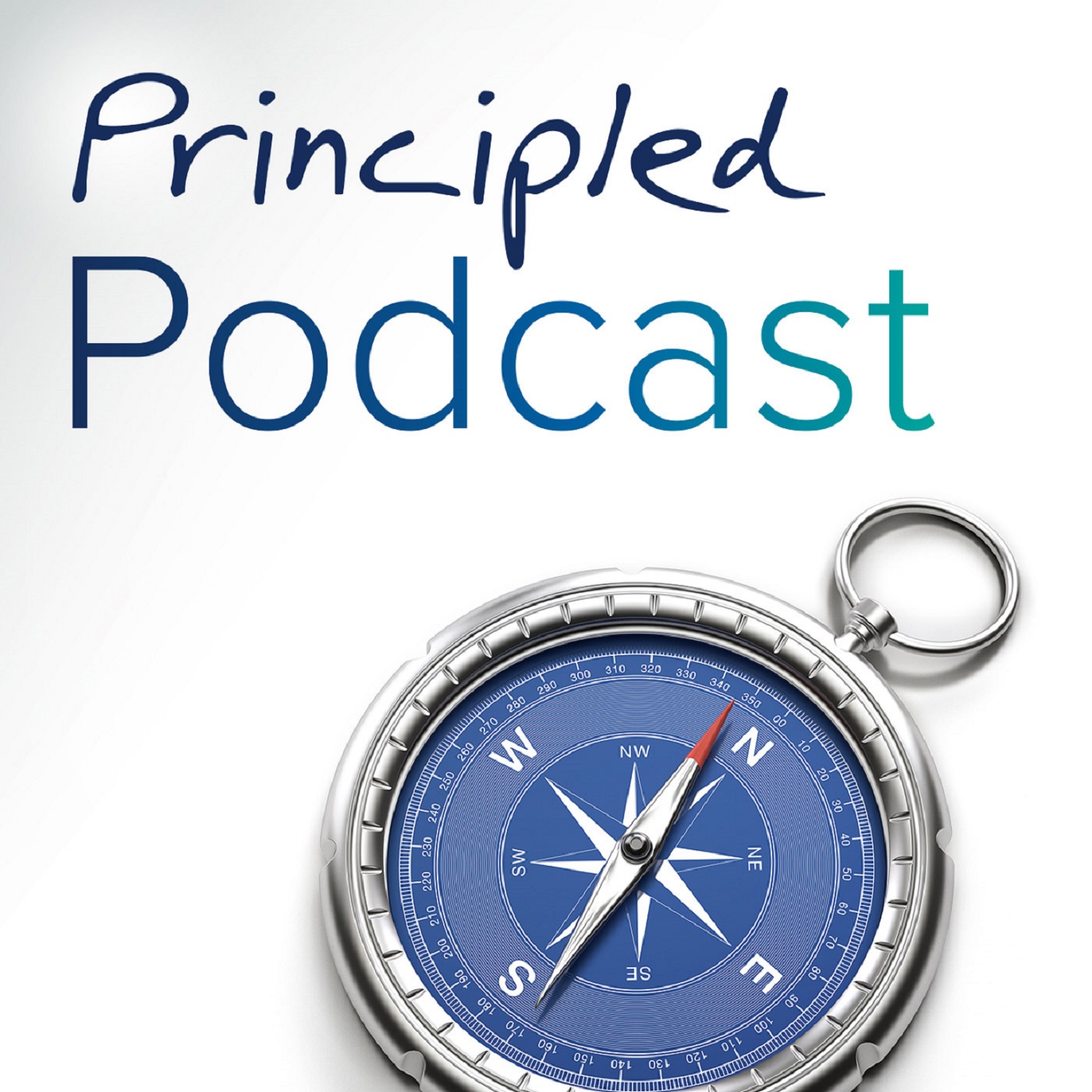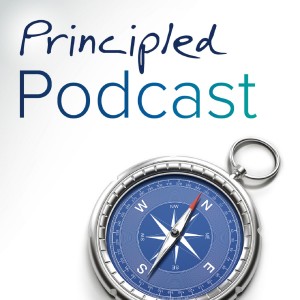
31.6K
Downloads
188
Episodes
LRN’s Principled brings together the collective wisdom on ethics, business and compliance, transformative stories of leadership and inspiring workplace culture. Listen in to learn valuable strategies and receive actionable advice from our community of business leaders and workplace change-makers.
Episodes

Friday Apr 16, 2021
Friday Apr 16, 2021
Eric Flesch, CEO of Colombia-based oil and gas company Promigas, talks with LRN’s Ben DiPietro about being an ethics and compliance leader in Latin America, and why it is so important he lead by example when it comes to asking employees to adopt and live the company’s seven core values.
“The seven values that we have in our company are respect, integrity, solidarity, responsibility, commitment, excellence, and entrepreneurship. So every person has to not only understand what each of those values means, but they also just accept them...and work on a day-by-day basis with those values.”
Previous to becoming the President of Promigas, Eric Flesch held the position of president at the Argos Corporation in the US, a company that he was involved with for 39 years through various positions and in which, since 2005, he played a strategic role in the expansion and growth of the organization in the US. Flesch has a degree in civil engineering from Universidad del Norte, with an MBA in finance and marketing from West Coast University. He also has taken executive leadership courses from institutions such as Stanford, Harvard, Berkeley, and Northwestern, among others.
What You’ll Learn on This Episode:
[1:19] How has Flesch’s career path led him to his current position at Promigas?
[3:07] What are the values that form Promigas’ culture and how does Flesch instill these values in new employees?
[5:39] How important is it that the employees hear from Eric Flesch and other leadership about the importance of ethics and values?
[7:08] Why does Promigas place such a high importance on ethics while other companies in Latin America seem not to?
[10:06] How has Promigas changed as a result of the cultural assessments they have done with LRN?
[11:11] Has Flesch seen changes in the assessment process throughout the years?
[11:42] How has Covid impacted Flesch’s work and what are the long-term changes that he anticipates as a result of Covid-19?
Find this episode of Principled on Apple Podcasts, Google Podcasts, Stitcher, Sound Cloud, Podyssey, or anywhere you listen to podcasts.
Transcription:
Intro: Welcome to the Principled Podcast, brought to you by LRN. The Principled Podcast brings together the collective wisdom on ethics, business and compliance, transformative stories of leadership and inspiring workplace culture. Listen in to discover valuable strategies from our community of business leaders and workplace change makers.
Ben DiPietro: Hello everyone and welcome to another episode of season five of LRN Principled Podcast. My name is Ben DiPietro. I'm the editor of LRN's E&C Pulse Newsletter. You can find that on our website, lrn.com. Click on the resources tab and click on newsletter. We hope you can sign up, we'd love to have you. With me today is Eric Flesch. He is the CEO of Promigas, a Colombia base oil and gas company. We are very glad to have him with us today. Welcome Eric, and thanks for taking some time to join us.
Eric Flesch: Hey Ben, how are you? Thank you for this invitation. I'm very pleased to join this podcast with you and all your team.
Ben DiPietro: Good. We're glad to have you here. Tell our listeners a little bit about Promigas, what it does, where it operates and how long you've been CEO and give us a brief rundown of your career path and how it's led you to where you are now.
Eric Flesch: Promigas is, I will say the largest public company, gas company in Colombia. It's listed in the stock market, was founded 45 years ago, and actually it has operations in Colombia and Peru. We are a cluster of 20 companies that, let's say, report to Promigas, are part of the Promigas group of companies. And basically we are in the transportation, the gas transportation and gas distribution business, also in the power distribution and gas services, engineering, of course, for gas projects. So we are, let's say, a company that leads the gas market in the transportation and gas distribution business in Colombia. Promigas is based in the main office in Barranquilla, which is on the Caribbean, on the north coast of Colombia. But we have other offices for our companies throughout the whole country. And of course, in Peru, in Lima and Trujillo also we have offices there. I joined Promigas almost three years ago. So my background, I'm still an engineer. I worked many, many years in other industries, in cement. Some of those years of experience were in the US and now I'm back in Colombia almost as I said before, three years ago, and leading this company.
Ben DiPietro: Interesting journey that you've taken then. Tell us a little bit about the values that form the foundation of Promigas' culture. How do you instill these values in employees, especially new employees as they come on board?
Eric Flesch: Promigas, one of the main focus of the company is to have a very strong corporate governance. And as part of it, we have our values which are very important for every employee. Not only to understand what those means, but also to take them, to take a lead at those. The seven values that we have in our company are integrity, solidarity, responsibility, commitment, excellence, and entrepreneurship. So every person has just, not only to understand what each of those values mean, but also just they accept them, they declare as part of the company that they work in the day-to-day basis with those values. And of course, we, in our, in the way we perform, in the way we think, in the way we make decisions, those values are part of it. It's not only a theory that is in a PowerPoint is something that is part of us, part of our DNA.
So every person in the company, which in total, we are over 3000 people in the cluster of 20 companies, as part of Promigas, they take those values as part of each one of them. And in our decisions, in our day-to-day is a natural part of our work. So, we feel very pleased that this is the way we work. And we periodically twice a year, three times a year, we just train our people and we have some kind of, let's say training sessions or conversations where we refresh those values. So, I will say proudly that everybody, all our people over 3000, they take those values as part of them. And they take it for every decision and every performance we do in our company.
Ben DiPietro: So how important then is it, that the employees hear from yourself and the other senior leadership and the board about the importance of ethics and values and creating the culture of compliance, transparency, and diversity that you're aiming to do?
Eric Flesch: It is extremely important, leadership means that the leader of the company in this case, myself has to in some way be an example about how to perform in the company and I like to be very close to each one of our employees, we have a plan to have a corporate video conference every quarter, over 1000, sometimes over 2000 of our employees can join in our video conference where we share the results of our company. We share our projects, the way we think is we are going to in the future, et cetera, et cetera. And also as part of these conversations our values and we like to listen to our employees, they ask questions and we are very open and we encourage to have a very close relationship with each one of our employees. That's the kind of management we deploy in Promigas everyday.
Ben DiPietro: Why does the company then place such a high importance on ethics as not as many companies in Latin America seem to, and what types of investments do you make in your E&C program to ensure it has the capability and gravitas to enact the agenda that you're setting out. And how has this differentiation paid off for you on the business side of the operation?
Eric Flesch: I would say Latin America and especially Colombia, which is part of the Caribbean, Latinos. The Latino culture is more informal. And in some way, if you compare the culture with any other company in Europe or the US, the DNA of a person is definitely totally different. So, we respect that culture, the natural culture of every person, but we don't negotiate and we encourage all of our employees, every employee to take the corporate culture. So we tell them look, we respect the natural culture, we respect that you like to dance, or you like to sing or you like to be outspoken, you like to be Latino, be Caribbean, that's okay. But regarding our corporation, we have with corporate culture, and this is what we would like to be, and this is what we like just to work with you along the coming years.
And those values are something that we invite everybody to take them and we implement training sessions to make sure everybody understands, everybody agrees. If anyone has a question, we make sure through, let's say tests, very friendly tests on the computers to people to respond, case studies, et cetera, where we differentiate the way we should act, we should make decisions we should perform. And we are very, let's say jealous or we're very strict that anyone has the perfect understanding of our ethics in the company.
As part of our corporate governance, this is a key piece. We are listed in the stock market in Colombia, also we issue bonds internationally. Two years ago, we issued some bonds in the US very successfully. And as part of these results, as part of this culture, our company is very well valued and the pay-off is that, we can just go and launch some bonds or launch some kind of, let's say programs that the market takes, because our company right now enjoys a very high reputation, as part of the ethics, as part of the corporate governance, which is very strong and is an example for any company in Latin America and the region.
Related Article: Key Role For E&C In Promoting Environmental, Social, Governance
Ben DiPietro: To that end, Promigas has been a long-time partner with LRN and we've helped you conduct three cultural assessments over the past seven years. How has your company changed as a result of these assessments? What have you learned about your culture from these assessments that surprised you either in a good way or bad way?
Eric Flesch: You're right. In the last seven years, we have had those assessments and every time our results are better and better and better. That is very encouraging for us because we made sure that by having our people with a perfect understanding on ethics, perfect understanding on how to behave in the company and understanding the corporate culture, this is for Promigas very, very important to let us just think internationally. As I said before, to do things like bond issues and all those kinds of things. So we see that paid off. And of course, by measuring the way we are progressing, we just adjust our programs, just to keep that track of getting better and better results on those measures.
Ben DiPietro: Have you seen some changes in the questioning? Has it been the same assessment each time? How is that assessment part of it evolved if you have?
Eric Flesch: We have seen some adjustments and for good and this is a feedback, constant feedback on our programs. And of course, this led in Promigas to get better results on the program itself.
Ben DiPietro: Obviously COVID-19 is changing the way we all work, live and interact. How has it changed the way you're doing your job? And what do you think will be the lasting impacts that occur because of this pandemic, as it relates to working in offices and just doing business?
Eric Flesch: Well, this COVID pandemic is something that no one had it in mind before. It was some thinkable that these would have had happened, but happened. And of course, when we realized last March 2020 about the pandemic, we made several decisions. First, we wanted to just ensure that there were workers, our employees, to have a good health just to protect them and to protect their families. So, we decided to organize everybody to work from home office and Promigas was supplying and was supporting to have everybody in their homes, their computer, their chairs. The ergonomic chairs they use in the office, the modem, the internet, et cetera to have a very good communication. Second, our other target we have at the moment was to ensure that we were rendering a good public service, transmitting gas, to all the industry, the commerce, and the residents in Colombia and Peru. As of today, after almost a year of this pandemic, I can say proudly that our service has been excellent.
We haven't had any trouble, we haven't had any interruption at all. And that was a result of our plan just to have everybody working with a good communication as if we were in our office, like normally. So the mutual work, I would say, has been outstanding the way we have done that as of today. Last, we focused on the communities in Colombia, Peru. Colombia and Peru are countries where poverty is high. And there are communities where we take gas to some regions in Colombia with a huge needs. And we decided to give our support by donations. So we decided to donate around $7 million, 6 million of that to Colombia and around 1 million to Peru, basically for three things, one to the health, let's say, the employees to have all the PPEs, second to support hospitals to buy respirators, and third to buy and to support rural communities by giving them basic needs like food or clothes or whatever that they would need at home.
Related Article: Covid: Doing What’s Right Requires Trust, Connection
So we decided to do that and in both countries, Colombia and Peru and everybody, those communities were very, very grateful with Promigas. This is part of what Promigas work with communities in the past before. Not by giving those high donations but we are also part of those communities and we are just trying to give all of our support to them by offering [inaudible 00:14:59], by helping kids to learn by building schools, et cetera, et cetera. So those were the main three things we decided.
And since that moment, March of 2020, up to now, we have still about 65% of our employees working in home offices. And then the others who are coming to the office, we have all the plan to keep them protected, not to put them at risk of getting infected. So all of that value of safety by having all those guidance on health and all those checkups and everything, we just follow that in a very strict way. That's the new, let's say, work that we adjusted our company mutually and so far, I would say we have been very, very successful and we have to be hope that after, we have now the vaccine in the near future, gradually we could come back again to the office to work as it was the normal work before.
Ben DiPietro: Yeah. It's hard to believe it's been a year already. It's amazing. Yeah. It seems like so much longer in a lot of ways. That's a be nice to get back out and hopefully soon. I want to thank you again for taking time with us. I appreciate it. And I hope you stay well and safe until we can all get vaccinated and get back out into the world. So, thank you very much, Eric. We appreciate you.
Eric Flesch: Thank you for your invitation, Ben. It has been a pleasure just to be with you and anytime you're more than welcome.
Outro: We hope you enjoyed this episode. The Principled Podcast is brought to you by LRN. At LRN, our mission is to inspire principled performance in global organizations, by helping them foster winning ethical cultures rooted in sustainable values. Please visit us at lrn.com to learn more. And if you enjoyed this episode, subscribe to our podcast on Apple Podcasts, Stitcher, Google Podcasts, or wherever you listen. And don't forget to leave us a review.
Find this episode of Principled on Apple Podcasts, Google Podcasts, Stitcher, Sound Cloud, Podyssey, or anywhere you listen to podcasts.

No comments yet. Be the first to say something!